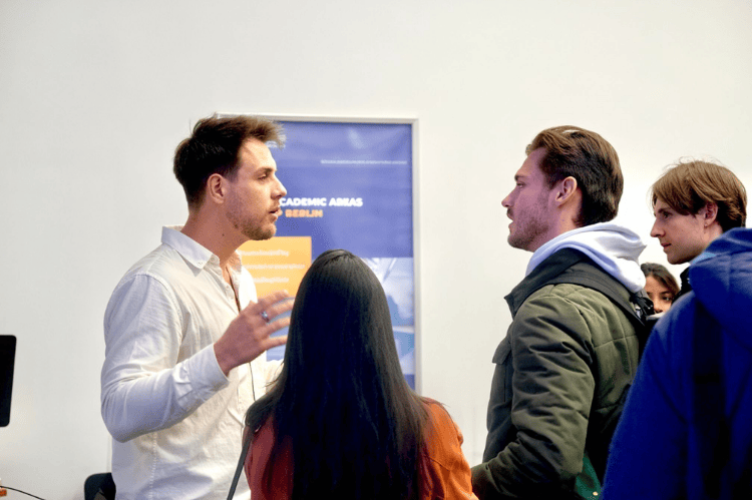Berlin Careers Event
Today’s Superpower: Building Networks. Why and How to Build Business Ecosystems Today?
ESCP Business School in Berlin recently welcomed Mikel Mangold, a globally renowned expert in Ecosystem and Partnership Operations, for a captivating lecture on building and navigating business ecosystems. With over 50 students participating in polls and more than 30 minutes of Q&A, the session was a dynamic experience for all attendees.
Mikel, who has extensive experience in both Silicon Valley and Berlin, shared his expertise on how the rapidly changing economy necessitates stronger partnerships and ecosystems for businesses to thrive. His lecture explored not only the mechanics of collaboration but also the fundamental shifts happening in today's economic landscape.
Three Factors Changing the Economy
In his presentation, Mikel opened with a discussion on the three major forces reshaping today’s business world:
- The Stakeholder Economy: Businesses are no longer just accountable to shareholders; they must consider a wider range of stakeholders, including customers, employees, communities, and the environment. This shift in business priorities aligns with discussions like those found in the World Economic Forum that highlight the need for companies to adopt more ethical practices.
- The Startup Economy: Startups have become vital players in the global economy, contributing to over 40% of new jobs. Reports like this one from McKinsey predict that startups will play a central role in Germany’s economy by 2030, driving partnerships with established corporations.
- Speed: Mikel emphasized the accelerating pace of today’s business world, where technology, markets, and consumer preferences shift rapidly. A BCG report noted that alliance deals surged eightfold from 2012 to 2020, underscoring the need for agility and partnerships in navigating disruptions.
These forces drive businesses toward one inevitable conclusion: the need to partner up. In an economy where speed and collaboration are critical, building and maintaining business ecosystems has become essential for long-term success.
The Four Pillars of Building Business Networks
A significant portion of Mikel's lecture focused on his "© Four Pillars of Building Business Networks," a framework designed to help businesses form lasting and productive partnerships. He outlined the following pillars:
- Mindset: First and foremost, companies need to develop the right mindset for partnerships. The concept of a "give-first" mentality, as elaborated in Mikel’s book Give First Mindset, plays a crucial role in building long-term, value-driven relationships.
- AI & Tools: Automation and AI are key enablers of partnerships in today’s business ecosystem. Tools such as Customer Relationship Management (CRM), Partnership Relationship Management (PRM) and Ecosystem Led Growth (ELG) can streamline processes and enhance collaboration.
- Partnership Education: Knowing how to build partnerships is as important as the partnerships themselves. Resources such as Partnership Leaders, Partner Principles, and Alliance Accelerator provide valuable insights and strategies for mastering partnership skills, from negotiation to conflict resolution.
- Networking & Events: Finally, finding the right partners requires intentional networking. Mikel encouraged our students to actively participate in industry events, conferences, and other networking opportunities to build relationships that could evolve into valuable partnerships. A McKinsey report highlights the importance of this; “A recommendation from a trusted friend is up to 50 times more likely to result in a purchase than a low-impact recommendation”.
By combining these four pillars, Mikel provided a comprehensive roadmap for attendees to develop and sustain successful business networks.
A Highly Engaged Audience
The session was met with enthusiasm and interest from ESCP students. With over 50 people participating in live polls throughout the lecture, the audience remained actively engaged as Mikel shared his insights on partnerships, technology, and business ecosystems.
Following the presentation, Mikel fielded questions from students for over 30 minutes. Students dove deeper into topics such as automating partnerships, overcoming cultural barriers in international collaborations, and the challenges of finding the right partners.
Mikel also took time to meet individually with several students, offering personalized advice and sharing real-world examples from his own experience. Several students expressed their thoughts on the lecture:
"Mikel’s insights on partnerships really shifted how I view collaboration. The emphasis on mindset and long-term value over short-term gains is something I hadn’t considered before."
“This workshop was truly enlightening. Thank you for the belt of handy AI tools you suggested. I will certainly dive deeper into those.”
"Mikel’s talk gave me a fresh perspective on how essential ecosystems are in business. It’s not just about networking but about creating long-lasting value through meaningful partnerships."
Key Takeaways from the Lecture
Reflecting on Mikel’s talk, several key themes stood out to attendees:
- Partnerships are Non-Negotiable: In today’s economy, businesses must build ecosystems to stay competitive. Whether it’s startups seeking corporate collaborations or established companies looking for new markets, partnerships are essential to navigate the rapidly changing landscape.
- Technology as an Enabler: The role of AI and automation in partnerships was an eye-opener for many students. Mikel’s emphasis on using tools to enhance collaboration resonated deeply with the audience.
- Mindset is Everything: Perhaps the most powerful takeaway was the importance of the right mindset. Mikel’s insistence that successful partnerships begin with a commitment to collaboration and shared goals struck a chord with students aspiring to work in multinational and multi-disciplinary teams.
Further Reading
Interested in delving deeper into these topics? Get your hands on a copy of Mikel’s book by clicking below. In this book, Mikel explores the intersection between the new startup and multistakeholder economy, mindset and networks.
Change happens when people with a collaborative and ecosystem mindset are plugged into the right networks. This book discusses seven mindset principles enabling the listener to thrive in the startup and multi-stakeholder economy by building and growing networks of ideas and knowledge, networks of resources such as capital and infrastructure, and networks of people to join your mission.
Campuses
